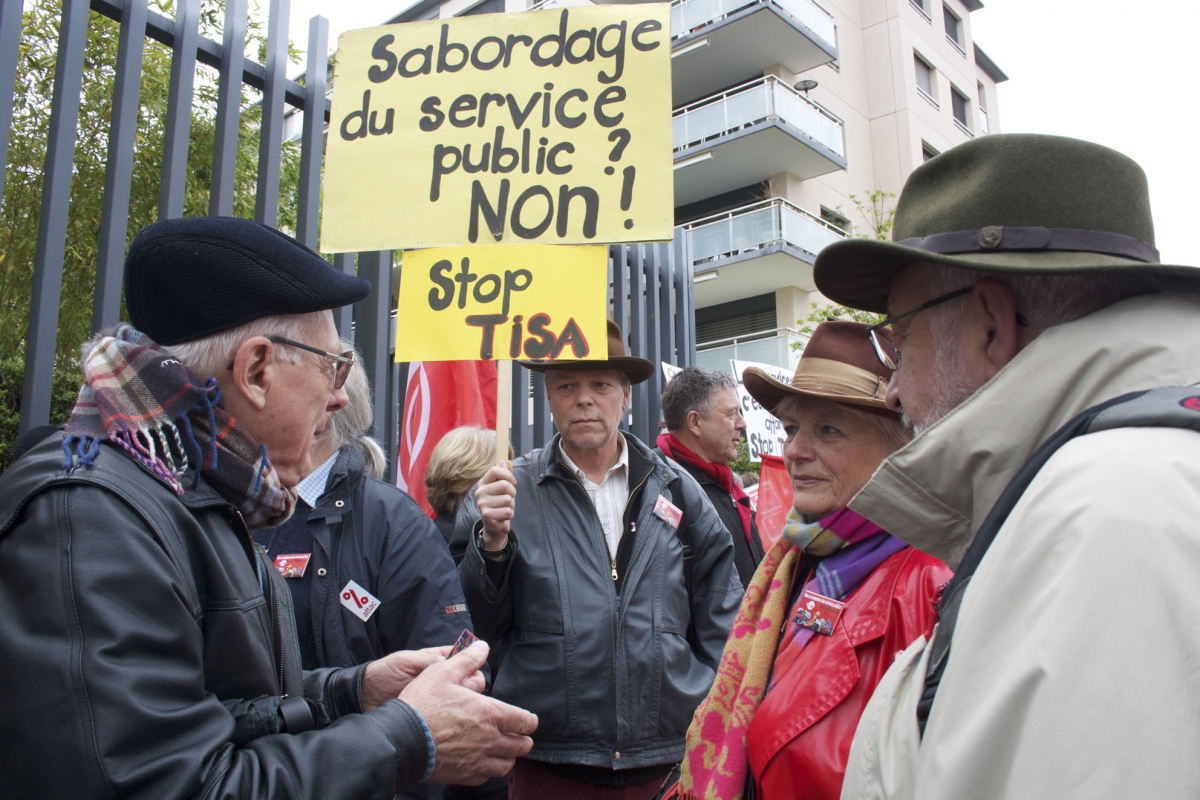TiSA must include a gold-standard clause to protect public services
EurActiv.com 13/02/2015
TiSA must include a gold-standard clause to protect public services
by Klaus Heeger
Great care is needed to make sure that European public services are excluded from the scope of the Trade in Services agreement under negotiation between the EU and 22 other trade partners. A possible solution could be to include a gold-standard clause, writes Klaus Heeger.
Klaus Heeger is the secretary-general of the European Confederation of Independent Trade Unions, (CESI).
ACTA, CETA, TTIP, TiSA: It sounds a bit like the beginning of a new hip-hop song, and indeed, almost no sector has experienced such a popularity boost as trade has.
A topic, which in the past merely picked the curiosity of incurable WTO-geeks, has meanwhile many diehard fans around the world.
The newest publications are impatiently awaited for like Harry Potter books, and, to jump on the bandwagon, let me briefly comment on TiSA, which, as aficionados would know, is a plurilateral trade in services agreement, which is being negotiated by 23 members of the WTO (including the EU) in order to facilitate and open up trade in services.
For the public sector trade unionists like me, facilitation has too simply meant liberalisation and opening up, privatisation. And we believe that, regardless of the tremendous economic importance which the service sector may have in and for Europe, free trade is, has been and will always be in a strained relationship to public services – these latter traditionally standing for monopolies, state aids and interventions; obstacles to be overcome in the name of liberalisation.
Yet we should never forget: Public services also guarantee that (common) goods are shared and that they are not simply made of the sum of individual (economic) interests.
The provision of such services is a public obligation, requiring intervention by the public hand, not a heavy and bureaucratic one admittedly, but clearly an intervention free from the mere logic of economic benefit.
The European Parliament rapporteur on TiSA, Viviane Reding, stated in a recent event that TiSA must be both "competitive and protective," adding that "public services are jewels of the European social model that need to be protected and excluded from TISA”.
Yes, public services are the essential component to ensure social and territorial cohesion, based on our social consensus that certain services should be available to everyone, regardless of the size of his or her wallet.
Are we ready to tackle the cold wind of global competition by giving up our standards and the delivery of services in the general interest by a fair, just and incorrupt public hand? Don’t these services warrants this very freedom and democracy, values and principles in the names of which free trade is summoned?
I think, or rather hope, that — except for some hardcore neo-liberals for whom only a weak public hand is a good one — we can all agree on the necessity to preserve our public services.
Great care is needed to make sure that our public services are excluded from the scope of the agreement – in the general interest.
How can this be done, if the definition of public services is far from being uniform, and if all services, i.e. including the public ones, are basically on the table of the TiSA negotiations?
We are caught in a dilemma: On the one hand, we cannot isolate ourselves from the world, on the other, we want to make sure that our social models and common goods that have been painstakingly acquired over centuries, are not drowned in globalisation and liberalisation dogmas, allegedly imposed by ruthless single market or free trade rules.
A compromise could consist in agreeing on a so-called gold standard clause — a clause, which would clearly exclude as widely as possible public services from the scope of TiSA.
Such a clause — even if it would certainly not remain undisputed — would deliver a clear political statement (and, depending of the circumstances, maybe even a legal and therefore enforceable one), a statement which – in addition to the exclusion of specific services, such as (core) governmental services, health, education, water supply or other public utilities- could serve as a political and legal argumentation bulwark to be triggered according to needs.
The Social Platform and CESI have made a concrete proposal for such clause:
It should firstly exempt public services as widely as possible from the scope of the agreement and would have to be inserted in the core text.
It should highlight that nothing should restrict the provision of services of general interest, whether economic or non-economic.
It should refer to the values of public services, underlining the absolute unquestioned role and discretion of national, regional and local authorities in the definition, provision and organisation of these services – so that TiSA could not serve in any way to justify liberalisation and privatisation in specific sectors.
And finally, such a clause should rule out the possibility of lowering standards established by the EU or by member states (for instance standards to protect the environment, health, consumers, social cohesion, labour standards and public procurement rules).
Such clause could de facto never fully guarantee that trade agreements have no impact on public services and protection standards (the mere facts that free trade is based on mutual recognition and the definition of common standards, and that all services, whether public or not, lie on the TiSA negotiation table, clearly point into another direction).
But it would represent a fundamental statement in favour of our democratic and fair principles, a basic irrevocable affirmation of what is important to us.
Klaus Heeger






